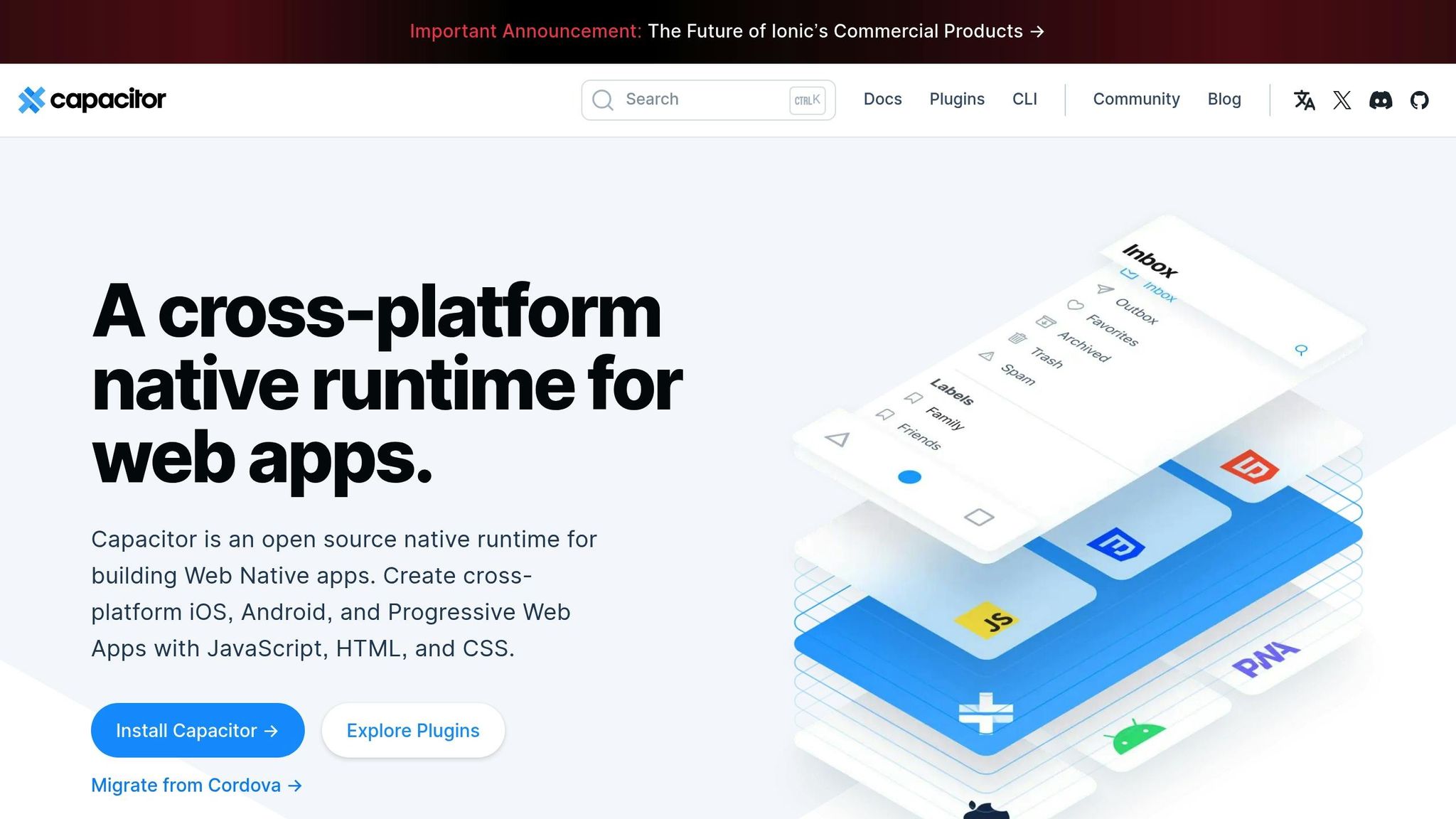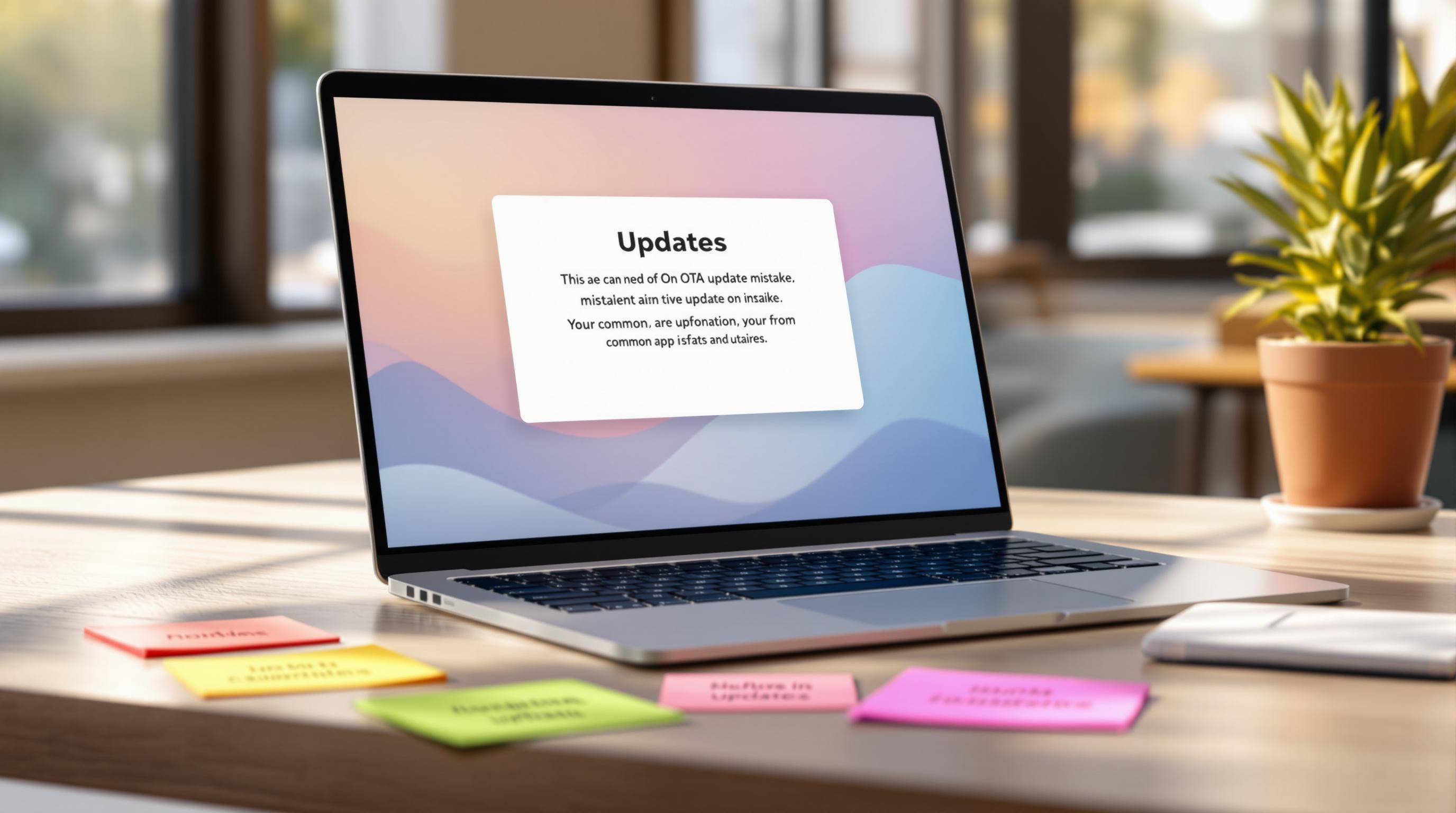Looking for a better way to manage updates for your Capacitor apps? With Microsoft CodePush shutting down in 2024 and Appflow scheduled to close in 2026, developers are turning to alternatives like Capacitor CI/CD plugins. Here’s a quick breakdown:
- Capacitor CI/CD Plugins: Open-source, customizable, and integrates with tools like GitHub Actions and GitLab CI. Offers features like live updates, end-to-end encryption, and partial updates. OTA updates start at $12/month. Optional CI/CD setup service for building native apps available for $2,600 one-time.
- Appflow: A centralized platform for builds and deployments but lacks flexibility. Costs $6,000/year and will be discontinued in 2026.
Quick Comparison
| Feature | Capacitor CI/CD Plugins | Appflow |
|---|---|---|
| Cost | From $12/month (OTA); optional CI/CD setup $2,600 | $6,000/year |
| Customization | High | Limited |
| Integration | GitHub, GitLab, Jenkins | Platform-specific |
| Future Support | Ongoing | Ends in 2026 |
| Setup Time | < 15 mins | Varies |
Takeaway: Capacitor CI/CD plugins are a flexible, cost-effective choice for long-term projects, especially as Appflow’s shutdown approaches.
Live Demo: Building Capacitor Apps in Ionic Appflow

Understanding CI/CD Solutions
Efficient deployment and update processes are critical in modern mobile app development. The advancements in CI/CD for Capacitor apps now provide developers with multiple workflow options. Here’s a breakdown of how different solutions handle CI/CD for Capacitor apps.
Capacitor CI/CD Plugins Explained
Capacitor CI/CD plugins offer an open-source approach to managing app updates, integrating smoothly with existing CI/CD systems. This method gives developers detailed control over deployment processes, making it a more customizable option compared to all-in-one platforms.
Capgo has shared some impressive stats: 95% of users updated within 24 hours, an 82% global success rate, a 434ms average API response time, and 5MB bundles delivered in just 114ms [1].
Here are some standout features:
| Feature | Description |
|---|---|
| Live Updates | Push updates and fixes instantly without waiting for app store approvals. |
| End-to-End Encryption | Ensures secure delivery of app updates. |
| Partial Updates | Saves bandwidth by downloading only the necessary changes. |
| Channel System | Distribute updates selectively, ideal for beta testing. |
| CI/CD Integration | Works seamlessly with tools like GitHub Actions, GitLab CI, and Jenkins. |
“We practice agile development and @Capgo is mission-critical in delivering continuously to our users!” [1]
Appflow Platform Basics
While CI/CD plugins emphasize customization, Appflow provides a more integrated solution. However, Appflow’s relevance is waning, with plans to shut down in 2026.
“Cancelled my @Appflow subscription after 4 years. Code-Push never seemed to work well, hopefully @CapGO has it figured out.” [1]
“@Capgo is a must-have tool for developers who want to be more productive. Avoiding review for bug fixes is golden.” [1]
The choice between granular control and an all-in-one platform depends on your team’s workflow and long-term needs. With Appflow’s impending shutdown, developers may find more lasting value in flexible, plugin-based solutions.
Features Head-to-Head
CI/CD Plugin Features
Capacitor CI/CD plugins are now designed to meet the needs of enterprise users. For instance, Capgo’s implementation delivers a 5MB bundle in just 114ms, with an average global API response time of 434ms [1].
Here’s a breakdown of what these plugins offer:
| Feature Category | Capabilities |
|---|---|
| Update Management | • Push updates instantly without app store delays • Send partial updates to save bandwidth • Use channel-based distribution for beta testing |
| Security | • End-to-end encryption • Securely deliver updates • Control access with detailed permissions |
| Integration | • Native support for GitHub Actions • Compatible with GitLab CI • Integrates with Jenkins pipelines |
| Analytics | • Track updates in real time • Monitor success rates • Measure user adoption |
These capabilities highlight the reliability and efficiency of plugin-based solutions [1]. Meanwhile, Appflow takes a different route.
Appflow Platform Features
Appflow focuses on providing a unified platform, but it sacrifices some flexibility in the process. Developers have expressed frustration with its implementation, as one shared:
“Cancelled my @Appflow subscription after 4 years. Code-Push never seemed to work well, hopefully @CapGO has it figured out” - LeVar Berry [1]
Appflow does offer tools for managing builds, deployments, and teams in one place. However, its limitations have pushed many organizations to explore other options. With over 750 apps already running on plugin-based solutions like Capgo [1], the trend shows a growing shift toward more customizable, developer-friendly alternatives. This shift reflects a preference for solutions that prioritize flexibility and control.
Cost Comparison
When evaluating these solutions, cost plays a key role alongside features and deployment efficiency.
CI/CD Plugin Pricing
Capacitor CI/CD plugins come with a straightforward pricing model. For example, Capgo offers OTA updates with tiered plans starting at just $12/month. For teams needing automated CI/CD pipelines to build native mobile apps, an optional setup service is available for a one-time fee of $2,600.
| Plan Component | Cost |
|---|---|
| OTA Update Plans | $12 - $249/month |
| Optional CI/CD Setup | $2,600 (one-time, for native build automation) |
This structure is particularly appealing for long-term projects, offering budget-friendly scaling options. On the other hand, Appflow takes a different approach.
Appflow Pricing Structure
Appflow uses an annual billing system, with costs reaching $6,000 per year [1]. This pricing has led many organizations to consider alternative solutions.
“We are currently giving a try to @Capgo since Appcenter stopped live updates support on hybrid apps and @AppFlow is way too expensive.” [1]
Over a five-year period, plugin-based solutions like Capgo could save organizations approximately $26,100 compared to Appflow [1]. This substantial difference, combined with Appflow’s lack of flexibility and uncertain future, has made alternatives more appealing.
“Jumped over to @Capgo after @AppFlow hit us with a $5000 bill for the year to continue. Loving CapoGo so far. Thanks for @Capgo, it’s a great product.” [1]
As development teams aim to optimize their budgets without compromising on deployment quality, these cost differences have become increasingly significant.
Setup and Usage
Getting your setup right is crucial for smooth development. Here’s a breakdown of how these two options compare when it comes to implementation and everyday use.
Working with CI/CD Plugins
Capgo works seamlessly with popular CI/CD platforms like GitHub Actions and GitLab CI. This allows teams to configure their pipelines directly within familiar environments. The setup is quick - taking less than 15 minutes [1].
One team shared their experience deploying to thousands of users:
“We rolled out Capgo OTA updates in production for our user base of over 5,000. We’re seeing very smooth operation; almost all our users are up to date within minutes of the OTA being deployed to @Capgo.”
On the other hand, Appflow takes a more centralized approach that requires teams to adjust to its ecosystem.
Using Appflow Tools
While CI/CD plugins focus on fast and easy integration, Appflow combines multiple features into one platform. However, this approach requires teams to fully embrace its ecosystem. While it offers a range of tools, some developers have noted difficulties with specific features, such as the Code-Push functionality.
Here’s a quick comparison of the two:
| Feature | CI/CD Plugins | Appflow |
|---|---|---|
| Setup Time | Less than 15 minutes | Varies |
| Integration | Works natively with CI/CD | Requires platform adoption |
| Learning Curve | Easy for CI/CD users | Steeper for new users |
| Customization | Highly flexible | Limited to platform tools |
Making the Right Choice
Open Source vs Closed Source
When choosing a CI/CD solution, deciding between open-source and closed-source platforms can shape your project’s future. Capgo’s open-source model stands out with its transparency and self-hosting options, giving you full control without the risk of vendor lock-in. This approach also allows for tailored deployments and tighter security measures.
The benefits of open-source are clear in practical use. For example, NASA’s OSIRIS-REx team shared their experience:
“@Capgo is a smart way to make hot code pushes (and not for all the money in the world like with @AppFlow) :-)” [1]
Here’s a quick comparison:
| Aspect | Open Source (Capgo) | Closed Source (Appflow) |
|---|---|---|
| Code Access | Full source code visibility | Proprietary, limited access |
| Hosting Options | Self-hosted or cloud | Cloud-only |
| Customization | Unlimited modifications | Restricted by platform |
| Security Control | Full oversight | Dependent on provider |
This level of control and transparency makes open-source platforms a solid choice for long-term projects.
Long-term Platform Support
The future of your CI/CD solution directly impacts your development workflow. With Appflow scheduled to shut down in 2026, it’s crucial to plan for a reliable and cost-effective alternative.
Here are key factors to weigh:
- Platform Stability: Capgo offers ongoing support and active development, while Appflow’s upcoming discontinuation could disrupt workflows.
- Cost Efficiency: Capgo’s $300 monthly pricing is a significant savings compared to Appflow’s $6,000 annual fee.
- Feature Continuity: Open-source platforms ensure essential features remain available, free from the changing priorities of a single vendor.
The industry’s shift toward open-source solutions highlights the importance of sustainability and independence. These factors are essential for creating a dependable CI/CD strategy that avoids costly and time-consuming migrations down the line.
Conclusion
The world of CI/CD solutions for Capacitor apps is changing fast, presenting new challenges and opportunities for developers and organizations. Comparing Capacitor CI/CD plugins with Appflow reveals differences in cost, customization options, and future reliability.
Organizations can cut costs significantly with plugin-based solutions while gaining more control over deployment and customization. With the shutdown of Appflow and CodePush, it’s crucial for developers to plan sustainable migration strategies to ensure smooth transitions.
These changes highlight the importance of choosing tools that offer strong features and reliable long-term support. For teams that value control and flexibility, Capacitor CI/CD plugins stand out by enabling self-hosting and tailored setups - meeting unique security and deployment needs while maintaining independence.
The decision between these solutions ultimately depends on immediate priorities and long-term goals. The growing preference for open-source, cost-conscious tools underscores their potential to support development efforts well into the future. This trend solidifies the appeal of open-source, flexible CI/CD tools for maintaining sustainable development practices.




